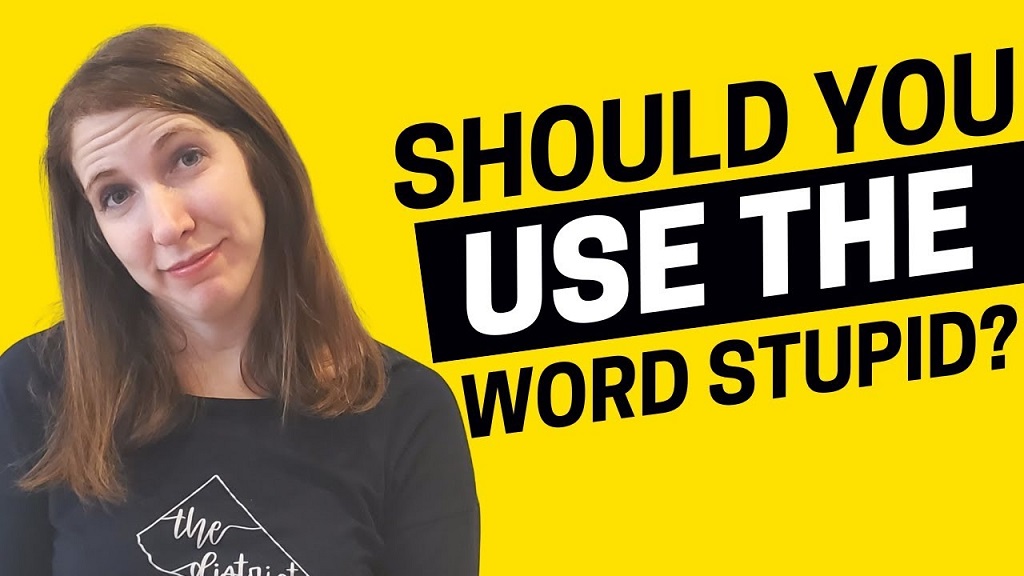Is ‘Stupid’ a Bad Word? Here’s the Answer
Five Trailer Components That Might Leave You Stranded (And How to Check Them)
September 22, 2025
Paramount Plus Cancel Trial on Different Device: Complete Guide
September 28, 2025Words carry weight. They shape how we communicate, influence relationships, and reflect our intentions. One word that often sparks debate is “stupid.” Some view it as a harmless descriptor, while others see it as an insult that can wound. So, is stupid a bad word? The answer depends on context, intent, and audience. At its core, “stupid” describes a lack of intelligence or poor judgment, but its impact hinges on how it’s used. A casual remark among friends might land differently than a pointed jab in a professional setting. This article dives into the word’s meaning, its social and psychological effects, and when it crosses the line into harmful territory. By exploring its nuances, we aim to provide clarity on whether “stupid” deserves its controversial reputation and how to navigate its use thoughtfully.
Table of Contents
ToggleUnderstanding the Word “Stupid”
What Does the Word “Stupid” Actually Mean?
“Stupid” means lacking intelligence, understanding, or common sense, often describing a person, action, or idea. Its meaning varies by context and tone.
The word “stupid” comes from the Latin “stupere,” meaning to be stunned or amazed, which evolved into describing a lack of mental sharpness. According to Merriam-Webster, it refers to someone or something showing a lack of intelligence or poor judgment. However, its meaning isn’t fixed—it shifts based on how it’s said and who’s hearing it. For example, calling a math problem “stupid” in frustration differs from labeling a person “stupid” in anger. The former might be a lighthearted expression; the latter can feel like a personal attack. Context is key. A 2019 study in the Journal of Language and Social Psychology noted that word perception depends heavily on tone, setting, and cultural norms, which explains why “stupid” can feel neutral in one moment and cutting in another.
Is Stupid a Bad Word in Everyday Use?
Whether “stupid” is a bad word depends on context. It’s not inherently offensive but can hurt when used to demean someone.
A common question people ask is, is stupid a bad word? The answer isn’t black-and-white. In casual settings, like joking with friends or describing a silly mistake, “stupid” often carries little harm. For instance, saying, “I did something stupid today,” is self-deprecating and relatable. Yet, when directed at someone else, especially in a heated moment, it can sting. The word’s power lies in its ability to undermine confidence or intelligence, which can feel personal. A 2021 article from Psychology Today highlights that labeling someone with negative terms like “stupid” can lower their self-esteem, particularly in children or sensitive individuals. Therefore, while not a curse word, its potential to harm depends on delivery and audience. In professional or educational settings, it’s often best avoided to maintain respect.
Why Do Some People Find “Stupid” Offensive?
Some find “stupid” offensive because it attacks intelligence, a core aspect of identity, especially when used with malice.
Words like “stupid” can hit hard because they target a person’s perceived worth. Intelligence is often tied to self-esteem, and being called “stupid” can feel like an assault on one’s identity. This is especially true for children, who may internalize such labels. A study by the American Psychological Association (APA) in 2020 found that negative verbal feedback, including words like “stupid,” can impact mental health, leading to anxiety or self-doubt. Additionally, cultural factors play a role. In some cultures, direct criticism is taboo, making “stupid” feel harsher than in others where bluntness is common. For example, in collectivist societies, insulting someone’s intelligence can disrupt group harmony, amplifying its offense. Even in casual settings, tone matters—sarcasm or anger can turn “stupid” into a weapon.
When Is It Okay to Use the Word “Stupid”?
Using “stupid” is usually okay in lighthearted, non-personal contexts, like describing objects or situations, but caution is needed when addressing people.
Not every use of “stupid” is problematic. Describing a malfunctioning gadget as “this stupid phone” or a confusing rule as “a stupid policy” is unlikely to offend. These uses are impersonal and express frustration without targeting anyone’s character. Similarly, self-directed use, like “I feel so stupid for forgetting that,” often invites empathy rather than judgment. However, caution is warranted when the word involves others. For instance, saying, “That was a stupid decision,” in a team meeting could alienate colleagues, even if unintended. The key is intent and delivery. If the goal is to critique constructively, alternatives like “unwise” or “not ideal” maintain professionalism. In social settings, knowing your audience is crucial—friends may laugh off “stupid” in jest, but strangers might not.
How Does Context Shape the Impact of “Stupid”?
Context determines whether “stupid” is harmful. Tone, setting, and relationship between speaker and listener shape its impact.
Context is everything when it comes to words like “stupid.” A playful tone among close friends can make it harmless, while a harsh tone in a classroom can devastate. Consider the setting: in a professional environment, calling an idea “stupid” might undermine collaboration, whereas the same word in a comedy show might get laughs. Relationships also matter. A parent calling their child “stupid” carries more weight than a peer using it jokingly. Cultural norms further complicate things—some languages have harsher equivalents, while others lack a direct translation, affecting perception. A 2022 study in Language Sciences noted that context-driven word interpretation influences emotional responses, meaning the same word can evoke laughter or tears based on how, where, and by whom it’s said.
Are There Alternatives to Using “Stupid”?
Yes, alternatives like “unwise,” “silly,” or “poorly thought-out” convey similar ideas without the harsh edge of “stupid.”
Choosing the right word can prevent hurt feelings or misunderstandings. Instead of “stupid,” consider these alternatives based on context:
- Unwise: Suggests poor judgment without attacking intelligence (e.g., “That was an unwise choice”).
- Silly: Lighthearted and less judgmental, ideal for casual settings (e.g., “What a silly mistake”).
- Misguided: Implies a lack of direction rather than ability (e.g., “The plan was misguided”).
- Not ideal: Neutral and professional, good for workplace critiques (e.g., “This approach isn’t ideal”).
These options maintain clarity while softening the tone. For example, in a classroom, a teacher might say, “That’s not quite right,” instead of “That’s stupid,” to encourage learning. At TeamFat Kids, resources emphasize positive communication to foster growth, especially in educational settings. By choosing kinder words, you reduce the risk of alienating or demotivating others.
What Are the Psychological Effects of Calling Someone “Stupid”?
Calling someone “stupid” can lower self-esteem, increase anxiety, and harm relationships, especially in sensitive or young individuals.
Words shape how we see ourselves and others. Labeling someone “stupid” can have lasting effects, particularly on children or those with low self-confidence. The APA’s 2020 study found that negative labels can trigger self-doubt and reduce motivation, sometimes leading to a self-fulfilling prophecy where individuals underperform due to perceived inadequacy. For adults, being called “stupid” in a professional or personal conflict can strain relationships and erode trust. However, the impact varies. Some may shrug it off, especially if the speaker’s intent is clearly non-malicious. Others, particularly those with past experiences of criticism, may internalize it deeply. Therefore, speakers should weigh the emotional cost of their words, especially in high-stakes or sensitive situations.
Read More Also: What Are Tyrone’s Unblocked Games?
Conclusion
The question “Is stupid a bad word?” doesn’t have a simple yes-or-no answer. Its appropriateness depends on context, intent, and audience. While it’s not a profanity, its ability to undermine confidence or intelligence makes it a word to use with care. In casual, non-personal contexts, it’s often harmless, but when directed at someone, especially with malice, it can hurt. By understanding its nuances and opting for kinder alternatives when needed, we can communicate effectively without causing harm. Want to dive deeper into thoughtful communication? Check out resources at TeamFat Kids for tips on fostering positive dialogue in education and beyond. Next time you’re tempted to use “stupid,” pause and consider: is there a better way to say it?
FAQ Section
Is “stupid” considered a swear word?
No, ” tipi “stupid” isn’t a swear word, but it can be offensive depending on how it’s used.
Unlike profanities, “stupid” is a mild term, often used to describe actions or things rather than people. However, its impact depends on tone and context.
Can calling someone “stupid” cause emotional harm?
Yes, it can lower self-esteem and cause anxiety, especially in children or sensitive individuals.
Negative labels like “stupid” can affect mental health, particularly when used repeatedly or with harmful intent.
What are some kinder alternatives to “stupid”?
Words like “unwise,” “silly,” “misguided,” or “not ideal” are less harsh.
These alternatives convey similar ideas without attacking someone’s intelligence or worth.
Is it okay to call an object “stupid”?
Yes, calling an object “stupid” is usually harmless as it’s impersonal.
For example, saying “this stupid phone” expresses frustration without targeting a person’s character.
How does culture affect whether “stupid” is offensive?
Cultural norms shape perceptions—some cultures find direct criticism like “stupid” ruder than others.
In collectivist societies, such words may disrupt harmony, making them more offensive.
Should “stupid” be avoided in professional settings?
AYes, it’s best avoided in professional settings to maintain respect and collaboration.
Using neutral terms like “not ideal” or “unwise” is more constructive and professional.
Does the tone of voice change how “stupid” is perceived?
Yes, a playful tone can make “stupid” seem lighthearted, while a harsh tone can make it hurtful.
Tone, along with context and relationship, heavily influences the word’s impact.





